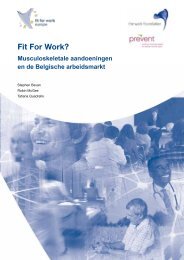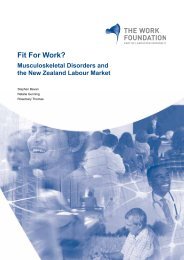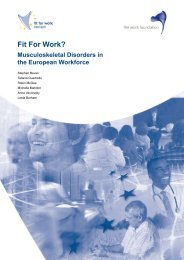FfW Bulgarian report (English language) - Fit for Work Europe
FfW Bulgarian report (English language) - Fit for Work Europe
FfW Bulgarian report (English language) - Fit for Work Europe
You also want an ePaper? Increase the reach of your titles
YUMPU automatically turns print PDFs into web optimized ePapers that Google loves.
Increasing work intensity is a very short-sighted approach to stimulating the <strong>Bulgarian</strong><br />
economy. Along with skills, training and qualifications, one of the most significant drivers of<br />
labour productivity in the EU is work<strong>for</strong>ce health and well-being. However, continuously high<br />
job demands will result in poor health and growing numbers of chronic health conditions in<br />
the <strong>Bulgarian</strong> work<strong>for</strong>ce. It is suggested that despite the high intensity of work, <strong>Bulgarian</strong><br />
workplaces are characterised by high job insecurity: in 2010 almost 30 per cent of employees<br />
feared losing their jobs in the following six months (<strong>Europe</strong>an <strong>Work</strong>ing Conditions Survey<br />
(EWCS), 2010).<br />
Additionally, due to financial hardship previously inactive people have considered re-entering<br />
the labour market. Bulgaria ranks among the top <strong>Europe</strong>an countries <strong>for</strong> employment of older<br />
people: 43.5 per cent of individuals aged 55 to 64 years of age choose to stay in the labour<br />
<strong>for</strong>ce, with an average age of exit from the labour market of 64.1 – one of the highest in EU. 4 As<br />
poor health and chronic health conditions become more prevalent with age, the health status of<br />
the elderly may have a significant impact on their per<strong>for</strong>mance.<br />
Ill health already presents <strong>Bulgarian</strong> employers with significant costs: up to 7 per cent of<br />
employees in Bulgaria have more than 15 days of sickness absence in a year (EWCS, 2010).<br />
In addition, at least 22.6 per cent came to work when ill (EWCS, 2010), which suggests that the<br />
productivity of a significant proportion of employees in Bulgaria may be reduced, without the<br />
employers being aware of that.<br />
These figures show that having a significant proportion of the working age population not<br />
per<strong>for</strong>ming to their full capacity due to ill-health – even in a favourable economic climate<br />
– can reduce the aggregate level of labour productivity in an economy and damage the<br />
competitiveness and effectiveness of private and public sector employing organisations.<br />
Furthermore, a significant burden of ill-health or chronic disease can also have a number of<br />
damaging social consequences. These arguments in<strong>for</strong>m a number of important implications.<br />
First, the competitiveness of the <strong>Bulgarian</strong> economy has been – and will be – substantially<br />
driven by the skills, experience and knowledge of its work<strong>for</strong>ce. Indeed Bulgaria has been<br />
making good progress towards becoming a ‘knowledge economy’ as envisaged by the EU’s<br />
2000 Lisbon Strategy (Lisbon <strong>Europe</strong>an Council, 2000). A 2006 <strong>report</strong> estimated the number<br />
of knowledge workers in Bulgaria was just 7 per cent less, relative to the <strong>Europe</strong>an average<br />
(Technopolis, 2006). However, the pitfalls of the health care system may be causing <strong>Bulgarian</strong><br />
workers to leave to seek medical help and better employment conditions abroad (Kokalov,<br />
4 See Eurostat http://epp.eurostat.ec.europa.eu/portal/page/portal/eurostat/home/<br />
Introduction<br />
<strong>Fit</strong> For <strong>Work</strong>? 11







